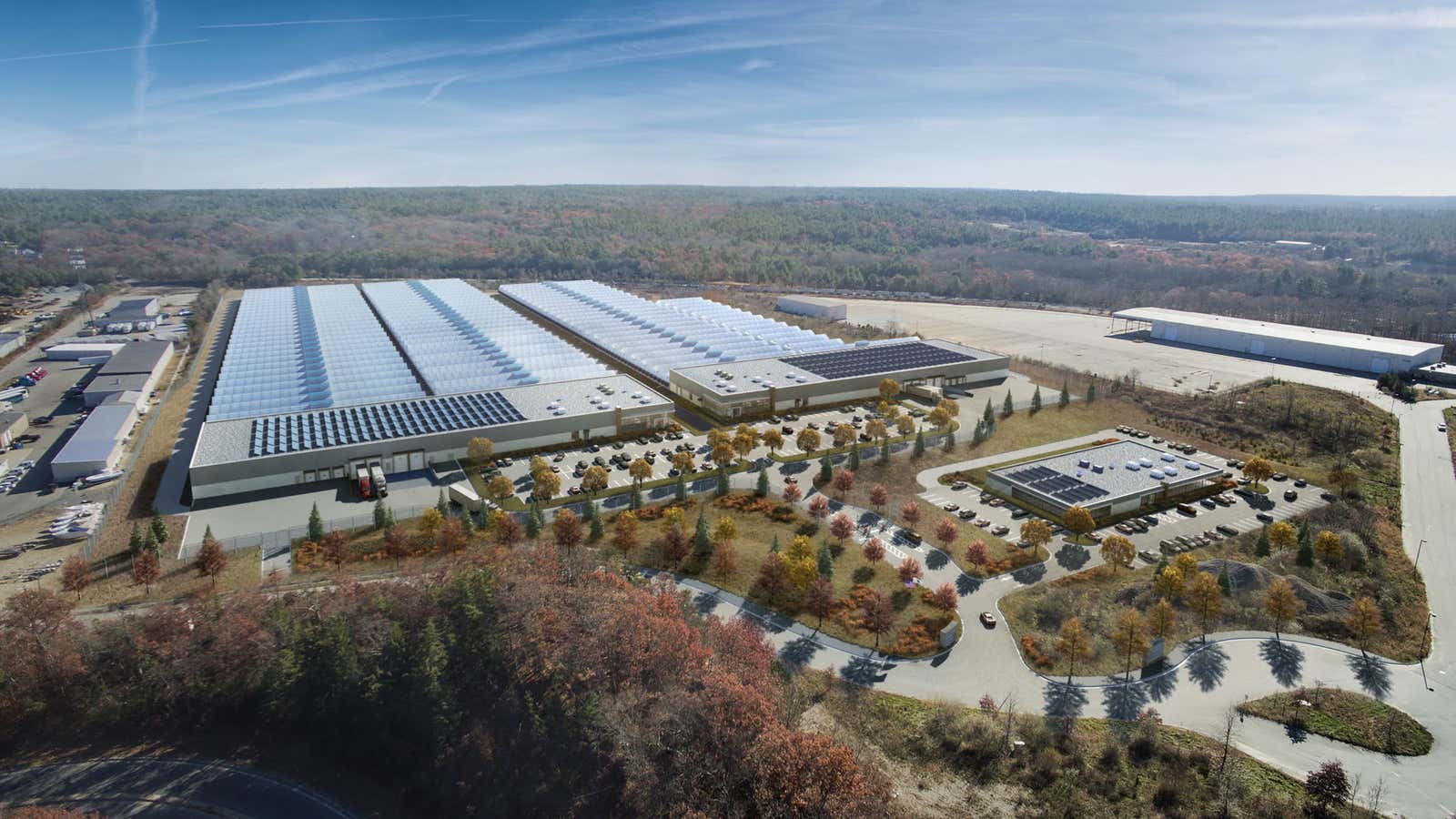California is at the forefront of the US medical marijuana industry, and weed’s positive impact on the state’s economy has been huge, generating $2.8 billion in 2015, with $6.5 billion annually expected by 2020.
The state’s largest grow facility was announced in June 2016 by GFarms, and is slated to be built in the town of Desert Hot Springs, which declared itself insolvent in 2014 and is now experiencing a real estate boom thanks to the marijuana industry. The GFarms facility will be 100,000 square feet and consist of three greenhouses on seven acres.
But it’s going to be eclipsed in size before long.
AmeriCann, a Colorado company, has announced much bigger plans to build the nation’s largest marijuana grow facility—in Massachusetts—in 2017.
Obviously, the prospects of enjoying an influx of cannabis cash similar to California’s is appealing to other states and legalization proved popular in the November elections. The national marijuana market is projected to generate $50 billion a year by 2026. But the transition from underground illegal drug trade to legitimate business isn’t fast or easy.
Large-scale projects are few and far between. It’s difficult to get financing to go into a business that is still illegal federally, so big marijuana projects—while potentially profitable—are shirked by the corporations most likely to be interested in this new industry; Big Tobacco and Big Pharma aren’t transforming into Big Pot yet.
“There isn’t some megalithic industry that exists today. There’s no Philip Morris, no Anheuser-Busch, no cannabis division at Bank of America. Even the most successful company is still barely in the growth stage,” Kris Krane, president of Massachusetts marijuana investment and consulting firm 4Front Ventures, told The Boston Globe (paywall).
The weed business is still very iffy—apart from financing problems, you can’t transport cannabis across states because of its status as a Schedule 1 drug, and there are numerous obstacles to entry, such as obtaining one of the limited number of licenses available in any given state. “It’s not for the faint of heart,” says Tim Keogh, president and CEO of AmeriCann.
Keogh became interested in cannabis in 2010 when a friend dying of stomach cancer in Florida, where medical marijuana was unavailable, mentioned its therapeutic effects. They joked about Keogh going out on the street to buy some but, in all seriousness, he was concerned about molds, potency, and other potential dangers associated with illegal drugs (like arrest, presumably). After his friend passed away, Keogh moved to Rhode Island, where medical marijuana was (and still is) legal, and started volunteering at another friend’s dispensary.
He became a marijuana legalization advocate in 2011, and in 2012 joined the Board of Coastal Compassion, a Massachusetts dispensary he eventually ran. That same year, Keogh founded the Cannabis Producers Association of New England, an advisory board, and in 2014 joined AmeriCann, an early entrant in the medical marijuana market in Colorado, as president.
This year, his experience in New England helped him facilitate the purchase of a Massachusetts property expected to be the largest and most technologically advanced grow facility in the country.
In March of 2017, construction is slated to begin on a 53-acre tract in Freetown, originally intended to be a Boston Beer Company brewery and acquired by AmeriCann this fall for $4.475 million.
The canna-business park will be 1 million sq ft and include energy-efficient greenhouses for cultivation, plant processing spaces, facilities for creating infused products, a testing laboratory, research and training centers, and corporate offices. Space will be sold or leased to businesses registered under the Massachusetts Medical Marijuana Program, and AmeriCann has a Host Community Agreement from Freetown that will enable businesses in the park to get streamlined preferential licensing. AmeriCann said in a statement that it “will set a new cannabis industry standard for energy efficiency, cost control, clean cultivation practices, and the production of Nutraceutical-grade infused products for the patients of Massachusetts.”
Medical marijuana has been legal in Massachusetts since 2012, but recreational weed just became legal in November. Keogh told the Boston Business Journal the November vote supercharged the plans for Freetown; development of the facility is expected to be completed faster to accommodate the growing business opportunities and AmeriCann is eying other locations.
The marijuana investment firm Arcview Group projects that cannabis will bring $1 billion annually to Massachusetts by 2020. Douglas Leighton, co-founder of Boston-based hedge fund Dutchess Capital, is betting big on canna-biz startups—investing in 20 such companies between 2103 and 2016—before federal laws change and powerful corporate interests get in and start profiting from weed at the expense of smaller companies. He told Boston magazine, “Eventually that will happen. Because that’s what happens.’’
